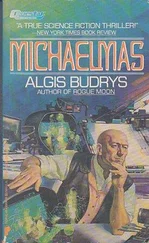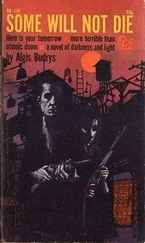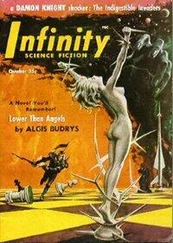Rogers sat down at the kitchen table, looking around stiffly for lack of something else to do.
The kitchen was neat and clean. There were curtains up over the sink, and there was fresh tile on the floor. There were no dishes left over on the drainboard, the sink itself had been scrubbed clean, and everything was put away, carefully and systematically. Rogers tried to picture the man washing, ironing, and hanging curtains — doing it all according to a logically thought-out system, with not a move wasted, taking a minimum of time, as carefully as he’d ever set up a test series or checked the face of an oscilloscope. Day after day, for five years.
The man set a plate down in front of Rogers: boiled potatoes, beets, and a thick slice of pork tenderloin. “Coffee? Just made some fresh.”
“Thanks. I’ll take it black, please.”
“Suit yourself.” There was a faint grinding noise as the man put the cup down with his metal hand. Then he sat opposite Rogers and began eating silently, without lifting his head or stopping. He was obviously impatient to get the necessary meal over and done with so he could get back to his work. Rogers had no choice but to eat as quickly as possible, and no opening to start talking. The meal was cooked well.
When they finished, the man stood up and silently gathered the plates and silverware, stacking them in the sink and running water over them. He handed Rogers a dish towel. “I’d appreciate your drying these. We’ll get done sooner.”
“Certainly.” They stood together at the sink, and as the man handed him each washed plate and cup, Rogers dried it carefully and put it in the drainboard rack. When they were through, the man put the dishes back in the cupboard, and Rogers started to put on his raincoat.
“Be with you in a minute,” the man said. He opened a drawer and took out a roll of bandaging. He held one end between the fingers of his metal hand and carefully wound a loose spiral up his arm, pushing his shirtsleeve out of the way. Taking safety pins out of his overall pocket, he fastened the two ends. Then he took a can of oil out of the drawer and carefully soaked the bandage before putting everything back and pushing the drawer shut. “Got to do it,” he explained to Rogers. “Dust and grit gets in there, and it wears.”
“Of course.”
“Well, let’s go.”
Rogers followed the man out into the yard, and they walked across to the barn. The dog ran up beside them, and the man reached down to pet his neck. “Get back in your house, stupe. You’ll get wet. Go on, Prince. Go on, boy.” The dog sniffed uncertainly at Rogers, trotted along with them for a few steps, and turned back.
“Prince? Is that his name? Nice-looking dog. What breed is he?”
“Mongrel. He’s got a barrel he sleeps in, back of the barn.”
“You don’t keep him in the house, then?”
“He’s a watchdog. He’s got to be outside. And he’s not housebroken.” The man looked at Rogers. “A dog’s a dog, you know. If the only friend a man had was a dog, it’d mean he couldn’t get along with his own kind, wouldn’t it?”
“I wouldn’t exactly say that. You like the dog, don’t you?”
“Yes.”
“Ashamed of it?”
“You’re pushing again, Rogers.”
Rogers dropped his eyes. “I suppose I was.”
They went into the barn, and the man switched on the lights. There was a tractor sitting in the middle of the barn, with a can full of drained transmission oil beside it. The man unrolled an oily tarpaulin, pulled it over beside the tractor, and laid out the tools that had been rolled inside it. “I have to fix this transmission today,” he said. “I bought this tractor second-hand, and the fellow that had it before chipped the gears. They’ve got to be replaced today, because I’ve got a field to harrow tomorrow.” He selected a wrench and slid under the tractor, on his back. He began loosening the nuts around the rim of the gearbox cover, paying no further attention to Rogers.
Rogers stood uncertainly beside the tractor, looking down at the man working under it. Finally, he looked around for something to sit on. There was a box set against the barn wall, and he went over, got it, and sat down beside the tractor, bending forward until he could see the man’s face. But that did him little good. Even though the gearbox had been drained during the morning, there was still oil dripping out of it. The man was working by touch, his eyes and mouth tightly shuttered, deaf, with dirty oil running in narrow streaks down across his skull.
Rogers sat and waited for ten minutes, watching the man’s hands working deftly at the cover, right hand guiding left, right hand, with its wrench, breaking the nuts loose with its hard fingers. Finally, the man put the wrench aside, locating the tool tarpaulin without difficulty, and lifted the cover down, dropping the nuts inside it. The left hand probed inside the gearbox, and a retaining slide dropped out, into the waiting right hand. The slide, too, went into the up-ended gearbox cover, and the left hand popped the gears out of their mounts. The man wriggled out from under the tractor and opened his eyes.
“I was going to ask you — ” Rogers began.
“Minute.” He stood up and took the worn gears over to a workbench, where he held them up to the light, cursing bitterly. “A man has no business buying machinery if he won’t treat it right. That’s a damned good design, that transmission. No reason in the world for anybody to have trouble with it.” His voice was almost querulous. “A machine won’t ever let you down, if you’ll only take the trouble to use it right — use it the way you’re supposed to, for the jobs it’s built to do. That’s all. All you have to do is understand it. And no machine’s that complicated an average man can’t understand it. But nobody tries. Nobody thinks a machine’s worth understanding. What’s a machine, after all? Just a few pieces of metal. One’s exactly like another, and you can always get another one just like it.
“But I’ll tell you something, Mr. Rogers — ” He turned suddenly, and faced across the barn. The light was behind him, and Rogers saw only his silhouette — the body lost in the shapeless, angular drape of the overalls, the shoulders square, and the head round and featureless. “Even so, people don’t like machines. Machines don’t talk and tell you their troubles. Machines don’t do anything but what they’re made for. They sit there, doing their jobs, and one looks like another — but it may be breaking up inside. It may be getting ready to not plow your field, or not pump your water, or throw a piston into your lap. It might be getting ready to do anything — so people are afraid of them, a little bit, and won’t take the trouble to understand them, and they treat them badly. So the machines break down more quickly, and people trust them less, and mistreat them more. So the manufacturers say, ‘What’s the use of building good machines? The clucks’ll only wreck ’em anyway,’ and build flimsy stuff, so there’re very few good machines being made any more. And that’s a shame.”
He dropped the gears on the bench and picked up a box holding the replacement set. Still angry, he ripped the top off the box, took out the gears, and brought them back to the tractor.
“Dr. Martino — ” Rogers said again.
“Yes?” he asked, laying the gears out in sequence on the tarpaulin.
Now that he’d come to the point of saying it, Rogers didn’t know how. He thought of the man, trapped in the casque of himself through these five years, and Rogers didn’t know how to put it.
“Dr. Martino, I’m here as the official representative of the Allied Nations Government, empowered to make you an offer.”
The man grunted, picking up the first gear and reaching up under the tractor to slip it in place.
Читать дальше












